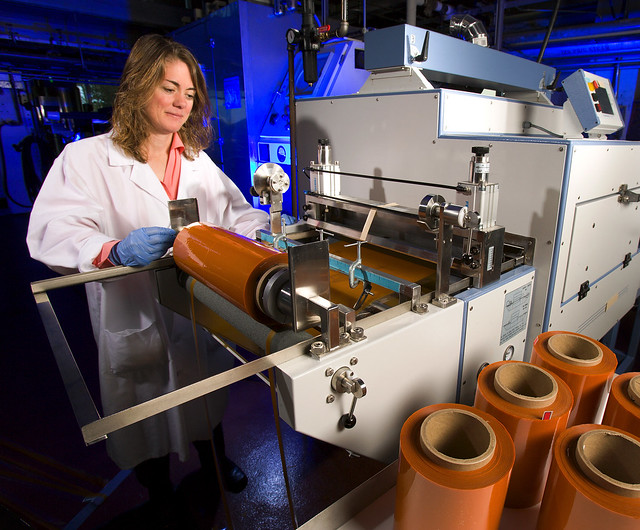
Sometimes food scraps can turn into gold. Tara McHugh, of USDA’s Agricultural Research Service (ARS), has overseen this alchemy as director of ARS’s Western Regional Research Center in Albany, California. Over the course of her career, McHugh has investigated ways to take food-processing waste and turn it into value-added products, such as fruit bars, vegetable crisps and even edible films made from produce.
Each year, the United States generates more than 62 million tons of food waste. Nearly half of that (42 percent) is lost by manufacturers and consumer-facing businesses.
“A good deal of waste is generated in the [food-processing] stage,” said McHugh. “That’s one of the reasons it’s important to conduct this research.”
At the ARS Albany Center’s Healthy Processed Foods Research Unit, McHugh has created multiple products to recover that waste and turn it into something valuable.
Among her favorite projects, McHugh created the world’s first 100-percent fruit bar by inventing a new technology that forms dried fruit into a bar. In 2003, the patent was licensed to Columbia Gorge Delights, a fruit-grower-owned company in North Bonneville, Washington. For more than a decade, the company used the technology to produce “Just Fruit” bars with fruit culled from local apple and pear harvests. In 2016, ZEGO Snacks bought the company and continues to produce the fruit bars. McHugh’s research earned her multiple awards. Equally important, it helped boost grower profits, create new jobs in a rural area, and produce a convenient, nutritious snack using culled produce that might otherwise have been thrown away.
McHugh also invented a technology to make edible films out of pureed fruits and vegetables that might go uneaten. Not only do these films look, smell and taste appealing, but they also protect food against spoilage and microbes. Her patented films are exclusively licensed and sold by NewGem Foods in products such as glaze sheets for ham and alternatives to tortillas and sushi roll nori (seaweed). The Washington State-based company has sold millions in product sales to date, representing more than 15 million servings of fruits and vegetables. This innovative technology received many awards, including the Popular Science’s 2001 “Best of What’s New.” The edible films are featured in Material ConneXion’s library, the world's largest physical collection of advanced, sustainable materials and processes.
McHugh’s research highlights the importance of technology transfer, a process in which research labs and universities develop technologies that are later used in commercial products.
Getting new technology from the research lab to the marketplace can take many different paths. “In some cases, ARS develops the technology first and then finds a commercial partner,” McHugh noted. “In other cases, we start with a commercial partner and work together to develop and commercialize the technology.”
This was how ARS collaborated with ReGrained, a new company that creates energy bars from brewers “spent” grain, which is nutritious but spoils quickly. ARS partnered with ReGrained to develop patent-pending technology to dry and process these grains into healthy, high-quality flours, transforming food waste into value-added – and tasty – products.
This spring, McHugh was named the 2019 ARS Distinguished Senior Research Scientist of the Year in honor of her research achievements. Recently appointed as director of the ARS Western Regional Research Center, McHugh reflected on the acclaim.
“It is an honor and a privilege to receive this award, which is not only recognition of my own research, but that of everyone with whom I have worked over the years,” she remarked. “I also feel very grateful that the research has had a positive impact on the world by improving health, reducing food waste, providing new jobs in rural areas, improving food safety, and reducing energy and water use in food processing.”
This blog series highlights innovations in food waste reduction as part of the Winning on Reducing Food Waste Initiative, a collaborative effort among USDA, EPA, and FDA to affirm their shared commitment to work towards the national goal of reducing food loss and waste by 50 percent by 2030.
